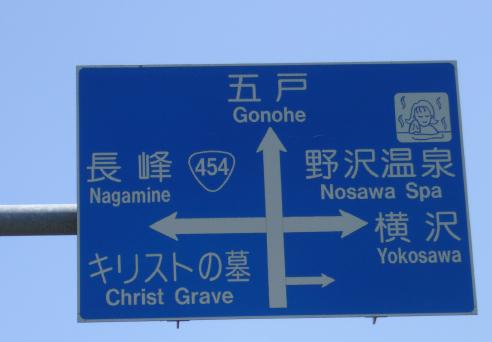 and now for something completely different – – – –
and now for something completely different – – – –
Quixie has an interesting blogpost about the Jesus in Japan Parahistory and the historical Jesus
I’m too intrigued by the origins of this set of beliefs, rituals and relics to laugh in disdainful mockery. Though the belief is said to be very old, I wonder how its age can be tested and whether there might be reason to think it all started some time after the seventeenth century Portuguese missionaries. Not that they would have taught this myth, of course. But we do see the way myths do mutate into forms that meet very different needs and functions from their original parents: e.g. Mormonism, Dave Koresh and such on our side; but I’m thinking in particular of nineteenth century’s Hong Xuiquan of China who became the focus of the Taiping rebellion. He set up a “Heavenly Kingdom” declaring himself to be the brother of Jesus. His ideas were initiated after reading some missionary tracts from Seventh Day Adventists, I seem to recall.
Quixie has some interesting photos and a video of a dance-singing ritual with his article.
There’s another article on Jesus in Japan here: Jesus Christ was their ancestor.
If you enjoyed this post, please consider donating to Vridar. Thanks!


Jesus has a tomb in Kashmir, another in Japan, and (I think) one or two in Palestine. This proves he is the son of God.
Three in Palestine: The Holy Sepulchre in the Church of the Holy Sepulchre (empty), the Garden Tomb at Gordon’s Calvary (empty), and the Talipot Tomb (empty, but containing DNA evidence that it was occupied for centuries after the Resurrection. Jesus sure did get around, didn’t he?
As Kenneth Humphries would say, “But it isn’t true… it isn’t hist’ry… it’s just more astounding rubbish.”
Thanks Neil
Given that burial mounds of that magnitude were usually reserved for important persons, I would venture to guess that if we were to exhume it (unlikely), what we would find buried there would probably be an esteemed Jesuit missionary from the eighteenth century. The adjacent grave likely holds his cherished relics.
The legend of the Christ grave only goes back to 1935 (the crosses were erected in the 50s, I think).
All of the hebraicisms forwarded since the days of the Takeuchi “discovery” are just wishful imagination run amuck, though.
The TaiPing story is fascinating as well. I’m familiar with it and I have a couple of books on that historical episode on my reading list queue.
In the post, I was trying to get the reader to note the urge to laugh, and to compare and contrast this to her reaction to mythicist ideas.
I appreciate your blog.
Ó
One wonders how such a legend could have arisen. Weren’t there enough locals within supposed living memory to say, “No, it never happened?” I’m being facetious. More than a few New Testament scholars and many more believers would argue the same logic to “prove” an historical Jesus.
At a guess i would say our definition or thoughts of what or who Jesus was are different from the locals where these burials exist. Like has been previously mentioned, some important leader died, got a fancy grave, and eventually when the xians came and spoke of a special leader the locals hazily mapped one individual with another. Another thing that interests me is the Roman concept of God. We today have a very different concept, for us a mere human could never be a or the god, and yet the Romans saw no problem with deifying their bigshots. However if one thinks of the god concept as an important ruler of the world, then it makes perfect sense, the problem for us is we are too focused on the inhumanity and removed aspect of the title. Back on Jesus, again we see it as a name, while other cultures see it as a title or concept. For these cultures, there probably have been many important leaders, some good, some bad. The good no doubtly did save the locals from some unfortunate circumstances so its fair to label siad hero as a saviour.
Just wondering what exactly did “Jesus” mean to the above mentioned Hong ? Its interesting because the concept of Messiah has many different meanings to different cultures and religions. From my minor readings there are some interesting parallels.
It’s many years since I attempted to do an in-depth research into Hong. Since then it looks like it is so easy to find information online: http://www.newworldencyclopedia.org/entry/Hong_Xiuquan and http://en.wikipedia.org/wiki/Hong_Xiuquan My recollection is that he believed in a literal heavenly Jesus and that he was the adopted younger brother to him. (Now has anyone ever suggested James might have been an “adopted” brother? 😉
What I find fascinating is his reading of Bible passages as applying to himself. We have known too many people doing that even today, or applying them to another person they revere as a leader.
Well lets not forget as you have mentioned many times there have been many Messiahs in just Judea itself before and after our JC. People in that area, obviously had certain ideas and understandings which each of these opportunists took advantage of. The Messiah concept was thus not solid but very much in flux and dynamic. Hong must have been quite a talker, and obviously the Chinese countryside must have a similar tradition as the Jews, otherwise he would not have been such a success. He is easily the most successful preacher in history, he must have been a very convincing talker, a miracle worker or perhaps he melded the Bible with some cultural heritage. How or why did those Chinese nbelieve him ?